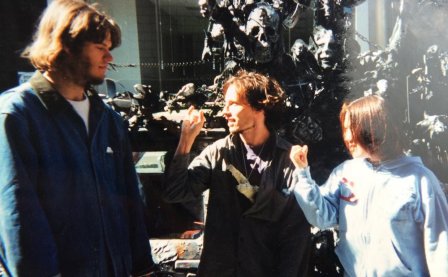Deerhoof defy categorization and instead invite cliché-ridden descriptors and excessive qualifiers. As the years have passed, the San Francisco band’s discography has grown more diverse, as have the adjectives used to describe their sound — brainy, pleasantly abrasive, appallingly abrasive, eccentric, addicting. While their early records garnered a great deal of mileage out of the contrast between the squelching bouts of noise and usually-bassist Satomi Matsuzaki’s silvery, high-pitched voice, they have increasingly melded these two elements into something weirder and more cohesive, and in the process, Deerhoof have created an identity for themselves that is at once immediately identifiable and impossible to properly pin down.
Breakup Song displays a melodic agreeability that won’t surprise anybody willing to pick apart the subtle intersections of sound making up last year’s severely underrated Deerhoof vs. Evil. The album’s clearest sonic precedent is 2009’s Friend Opportunity, with which it shares happily crunchy production, but unlike that album, Breakup Song has a laser-sharp focus. Indeed, this new offering is unlike most of Deerhoof’s other albums in its specificity of references. In an interview with Stereogum, Matsuzaki declared that this album sounded “like a party,” and she’s right: this is Deerhoof in the club, their playful take on “party music” as a concept. Deerhoof have always engaged in hyperactive pop deconstructionism, but this album is more explicitly chart-oriented than anything they’ve done before. No, there are no Top 40 jams to be found here, but there are elements of those very jams peppered purposefully throughout. “There’s That Grin” ends with a play on current dance-pop’s familiar four-on-the-floor thump, while “Zero Seconds Pause” revolves around Matsuzaki’s declaratory, “Now I am going dancing.”
And there are legitimately danceable rhythms here, albeit ones coated in Deerhoof’s unique patchwork quality. Saunier’s signature itching-and-twitching drum work is on full display, constructing complex yet grounded beats. They are, for the most part, 4/4-oriented, although Deerhoof’s penchant for odd numbers and uneven phrases manifests itself plenty. These off-kilter structures have always complemented Matsuzaki’s remarkable talent for writing simple and memorable melodies; on “Mothball the Fleet,” they do more than that — they actively surround Matsuzaki’s wandering hooks, culminating in an unexpectedly sweet piano-and-vocals lullaby. The band’s old trick of having a short figure repeat over and over until it transforms into a hook makes several appearances on the album; the philosophy governing that trick shows up across instrumental passages as well. There’s something incredibly satisfying about hearing the unusually epic opening of “To Fly or Not to Fly” self-compartmentalize into a slinky groove. Similarly, the aforementioned “Zero Seconds Pause” runs down so many twists and turns that it would be disorienting to listen to if it wasn’t so damn infectious.
There are no weak tracks on Breakup Song, and the album unfolds at a natural pace. Just short enough to resist sagging at the middle, it also ends with a quartet of songs that are more radio-friendly than anything the band has ever done. But “radio-friendly” doesn’t merely mean that a radio DJ could get away with playing, say, “The Trouble With Candyhands” on the air. That song, “We Do Parties,” “Mario’s Flaming Whiskers III,” and closer “Fête d’Adieu” all resemble the funhouse tapestry making up so much contemporary radio pop. It’s a gesture reflective of Breakup Song’s album cover, a trash truck resembling some sort of over-the-top party bus; similarly, these final four songs take rough and unseemly elements — a phone dialing away frantically, some particularly flammable horn stabs — and spin sheer celebratory joy out of them.
More about: Deerhoof




